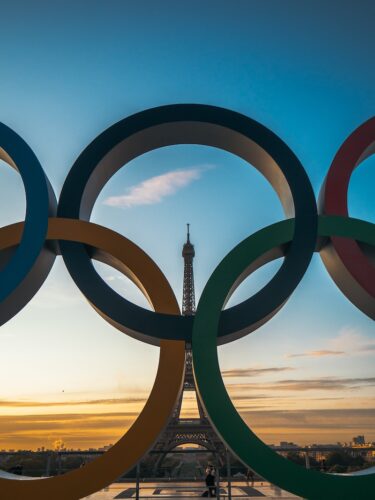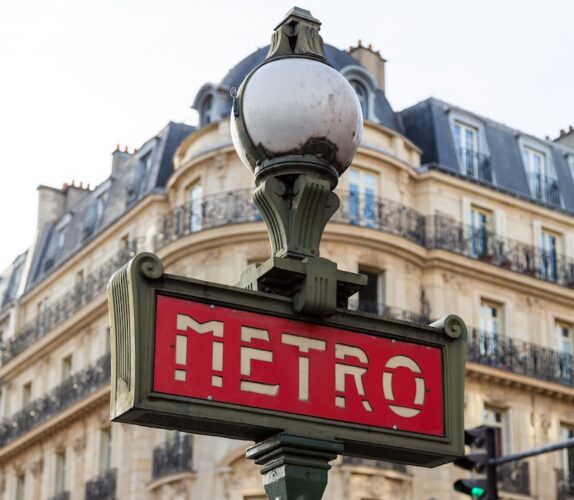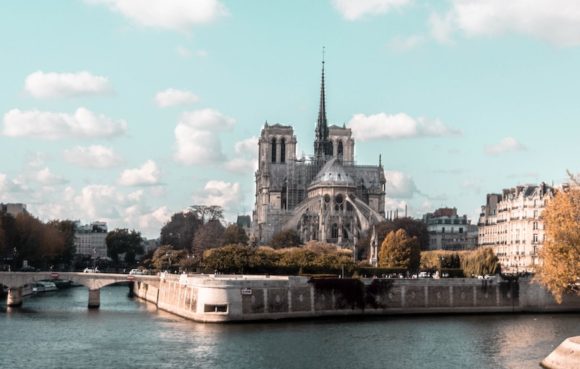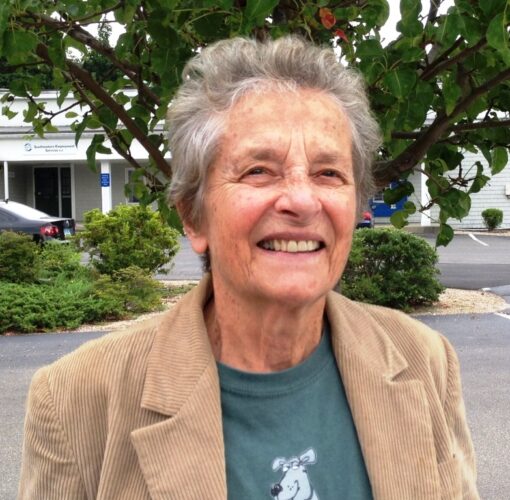
The countdown has started for the Summer Olympic Games 2024 (or J.O. [Jeux Olympiques] 2024 as the French say) and the excitement is growing. The dates are July 26 through Aug. 11, and Aug. 28 through Sept. 8 for the Special Olympics . Paris will be the host of the events.
The interface of an historical city like Paris with venues for sporting events should be magical while also being a challenge. Imagine watching beach volley ball under the Tour Eiffel or breakdancing on the Place de la Concorde !

The J.O. 2024 mark the centenary of 1924 inauguration of the first modern Olympic games. It will be the sixth time for France to host the event, and also represents the largest event ever organized in the country. There will be total parity between men and women athletes – a first in the history of the games.
On Aug. 26, 2023, a disappointing announcement was made: because of a series of spring downpours, the sewers overflowed and ran into the Seine, which was declared too polluted to serve as a venue for water sports. The preparatory work for the competition on the Alexander III bridge had to be dismantled.
In order to prevent the recurrent surge of polluting water into the Seine after storms, a gigantic project has been undertaken. Between the Gare d’Austerlitz and the Hopital Salpêtrière east of the city, several blocks of apartment buildings were razed to make room for a “bassin de rétention” 50 meters in diameter. At the bottom of a 30 meter-deep well a massive “tunnnelier” machine will dig a tunnel under the Seine for huge pipes to be laid. Other bassins will be constructed upstream east of Paris.
In a way the scheduling of the games in 2024 is helping to speed up this huge project of assainissement (sanitation). Some day soon, maybe one will be able to swim in the Seine!
Logistics will be a major headache for the games officials, mostly to organize transport. Flying taxis will turn the skies of summer 2024 into a science-fiction scene of the future. A 10-minute flight from Charles DeGaulle airport can certainly beat a two-hour long ride by public transport.
Additional buses and trams will compensate for the closure of many metro and bus stops in central Paris and on the Périph (Beltway), a special lane will be reserved for athletes and games officials.
The fully automated subway ligne 14 will be extended to include Orly airport and a new métro station will open near the Stade de France.
In order to assist in welcoming at least 13 million visitors, 40,000 volunteers positions were offered and filled up immediately.
Security will be a top priority , particularly during the opening ceremony which will be watched by 600,000 spectators. All of them are obliged to have a ticket, including the 400,000, holding free tickets.

Order will be maintained by 35,000 police. According to Gerald Darmanin, Minister of the Interior, the scope of the security plan is unprecedented, since it will cover six kilometers along the banks of the Seine when a parade of 115 boats will end up at the Trocadéro and the foot of the Tour Eiffel .
A security perimeter will be installed around the city against any possible acts of terrorism. More than 4,000 video-surveillance cameras will function with “smart” AI algorithms to protect private data.
Anti-drones will be there also. During the Tokyo games, 400 million cyberattacks were detected. In Paris, the organizers will be ready for such a possibility.
How expensive will the tickets be? It is hard to give the exact prices since they depend on the competition. Just to give an idea, the most expensive seat at the opening ceremony will cost 2,700 Euros and the cheapest 90.
At the closing ceremony, the respective prices are 1,600 and 45 Euros.
Two of the most expensive competitions to watch will be Athletics at 900 Euros and swimming at 690 Euros. At the other end of the price range, tickets to watch the marathon or the urban games on Place de la Concorde will be either quite low or even free. In spite of the fact that many tickets have been made available for free, people complain that prices are much too high.
Given the politically-poisoned environment existing at present in France, it is hoped that the social unrest in the streets will not flare up again and add to the huge logistics problems of managing millions of spectators. As expected, criticisms of Paris 2024 abound centered primarily on protests against the entrance tickets being so expensive that the average person cannot afford them.
In fact, most Parisians will probably want to flee the capital during the games. Hotel rooms and AirBnB apartments will be offered at exorbitant prices.
Most of the infrastructure to accommodate the Olympic sporting events already exists. The Aquatics Center for swimming and diving competitions is an exception.
Close to 95 percent of the financing comes from the private sector. Private investors will bear the cost – estimated at 1.3 billion Euros – of the Olympic village. This is where the 10,500 athletes will stay in the Saint Dénis area, north-west of Paris. Architects have designed the temporary lodgings to be easily transformed into permanent apartments for low-income French residents.
Except for the surfing competitions, which will be held in Tahiti, 9,800 miles away from Paris (certainly not next door!), all the sporting events will take place in 30 sites equally divided between Olympic and Special Olympics throughout France but mostly in and around Paris.
If you enjoy sightseeing in the old city, you might be interested in knowing that some key historical sites will be turned into “Sport Arenas” for various disciplines. Examples are:-
Place de la Concorde : skateboard (first time in J.O.) ; breakdancing; BMX bicycle free style, basketball
Les Invalides: Archery
Eiffel Tower stadium and Champ de Mars: Judo and Wrestling; Special Olympics (wheelchair rugby)
Rolland Garros: Tennis
Chateau de Versailles: Equestrian events, Dressage, Horse-jumping
Hotel de Ville to Les Invalides: a 42km-long marathon touching on many historical monuments of Paris. On the first day, 80 men will run. On the second day, 80 women .
Pont d’Iena: a beautiful location for spectator stands
Grand Palais: Fencing, Taekwondo (Korean martial art)
Trocadero: Start of the road cycling races, 273 km
Parc de la Villette (north of Paris) largest cultural park in Europe.
Celebration Centers during the Games to meet athletes are:
Parc des Princes: Football
Vaires sur Marne Nautical Stadium: Rowing, Canoeing/Kayaking
Marseille: Sailing
La Défense Arena, Aquatics Center: Swimming and diving
Stade de France (also called Stade Olympique): Athletics. This is the oldest discipline, going back to 776 BC in Greece
St Quentin-en-Yvelines: cycling track

To top it all, President Emmanuel Macron has a vision of Notre Cathedral opening for the public with a celebration of mass to coincide with J.O. 2024. That would indeed make these ‘The Games of the Century’!
Editor’s Note:This is the opinion of Nicole Prévost Logan.

About the author: Nicole Prévost Logan divides her time between Essex and Paris, spending summers in the former and winters in the latter. She writes an occasional column for us from her Paris home where her topics will include politics, economy, social unrest — mostly in France — but also in other European countries. She also covers a variety of art exhibits and the performing arts in Europe. Logan is the author of ‘Forever on the Road: A Franco-American Family’s Thirty Years in the Foreign Service,’ an autobiography of her life as the wife of an overseas diplomat, who lived in 10 foreign countries on three continents. Her experiences during her foreign service life included being in Lebanon when civil war erupted, excavating a medieval city in Moscow and spending a week under house arrest in Guinea.
Thank you for this wonderful report. I am writing from Paris 7-Eleven where we have had a pied à terre for 40 years. We live in old Lyme!